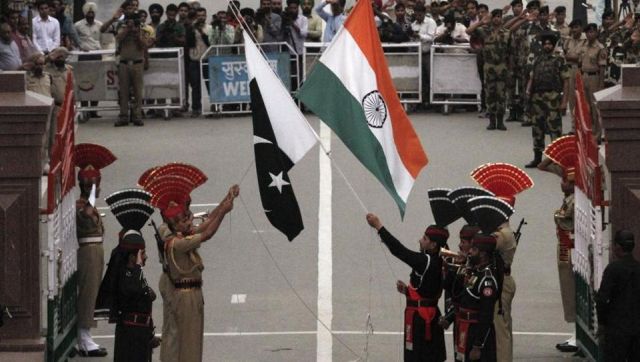
by admin | May 25, 2021 | News, Politics
 By Arul Louis,
By Arul Louis,
United Nations : Cross-border terrorism from Pakistan is at the root of the current situation in Kashmir and it has also victimised the people of the part of the state occupied by Pakistan, India said on Tuesday dismissing Islamabad’s attempts to raise the Kashmir issue at the UN Human Rights Council (UNHRC) meeting in Geneva.
“Jammu and Kashmir is an integral and inseparable part of India and will always remain so” despite Pakistan’s use of “terrorism as a state policy” for territorial aquisition, Sumit Seth, a First Secretary in India’s UN Mission in Geneva, said on Tuesday while exercising the right of reply to Pakistan’s allegations about India.
“The present situation in the Indian State of Jammu and Kashmir is the direct result of sustained cross-border terrorism emanating from Pakistan,” he said.
“The high number of casualties sustained by Indian security forces is a reflection of the tremendous amount of restraint displayed by them under these difficult circumstances.”
Pakistan’s Permanent Representative in Geneva, Farukh Amil, raked up the Kashmir issue while taking exception to UN Human Right Commissioner Zeid Ra’ad al-Hussein criticising India and Pakistan on Monday for not allowing a fact-finding team to the Indian state and the part occupied by Pakistan.
Amil asserted that reports of atrocities and human rights abuses emanated from the Indian state and not from the part of it occupied by his country and, therefore, questioned al-Hussein equating the two countries.
Amil alleged that al-Hussein’s statement was not based on facts.
Seth in his rejoinder said that India had “a robust institutional framework to ensure adherence to the rule of law and respect for fundamental rights of the people in Kashmir” built on an independent judiciary, the National Human Rights Commission, vibrant civil society and free and vocal media.
The people of the Indian state have regularly exercised their democratic rights, Seth added.
“In contrast, the people of Pakistan as well as Pakistan Occupied Kashmir have become victims of sectarian conflict, terrorism and severe economic hardship due to Pakistan’s authoritarian and discriminatory policies in complete disregard of human rights,” Seth said.
When the floor was opened at the council meeting on Tuesday to NGOs and civil society organisations, a motley group of them let loose a volley of propaganda against India.
According to a summary of the proceedings prepared by the HRC, some of these centred on India and Pakistan not allowing a fact-finding mission to the Indian state and the Pakistan-occupied portion of it, while others singled out India.
The Association for the Protection of Women and Children’s Rights said there was a need to focus on the situation in territories under foreign occupation and lumping Kashmir in that category it asserted that human rights violations had increased there because the HRC mission was not allowed in.
Commission Africaine des Promoteurs de la Sante et des Droits de l’Homme said that terrorism and systematic human rights violations in Kashmir required more attention by the High Commissioner and that unprovoked heavy shelling had resulted in daily deaths of civilians.
A group called Liberation alleged that India was experiencing increasing religious intolerance under the pretext of the protection of the “holy cow”.
Indigenous People of Africa Coordinating Committee claimed that homes of non-Hindu minorities had been systematically destroyed and their products were regularly boycotted.
Centre for Organisation Research and Education said that members of scheduled tribes and castes were victims of rape and honour killings.
A group called Tamil Uzhagam said that human rights activists in Tamil Nadu needed the UNHRC’s protection.
(Arul Louis can be reached at arul.l@ians.in)
—IANS
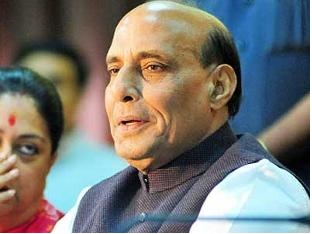
by admin | May 25, 2021 | News, Politics
 By Sheikh Qayoom,
By Sheikh Qayoom,
Srinagar/Jammu : Union Home Minister Rajnath Singh on Monday sought to address the concerns over the legal challenge to the Constitution’s Article 35A by stating that the Narendra Modi government would do nothing that would go against the aspirations of Kashmiri people while also asserting that he was ready to come here and meet anyone to bring peace to the state.
Concluding his two-day visit to the Kashmir Valley on Monday, he also said that the situation here was improving and he could see “the green buds of peace on the trees”.
Addressing the media before leaving on two-day visit to Jammu, he said the controversy round article 35A was a non-issue that was being unfortunately raked up.
“The centre will do nothing that would go against the wishes and aspirations of the Kashmiri people regarding article 35A.
“I feel there is no reason for doubt and confusion on this issue. The centre has not gone to the court in this regard and I want to assure that whatever our government will do, it will not go against the wishes and aspirations of the people,” he said.
Asked about the divergent positions taken by the RSS and even the BJP leaders and ministers who were demanding the abrogation of the article that gives special privileges to the permanent residents of J&K, an assertive Rajnath Singh said: “I am a BJP leader and the Home Minister of the country. My statement on this issue should be taken as final.”
Chief Minister Mehbooba Mufti and her predecessor Omar Abdullah both welcomed the assurance, but the latter also sought that the central government should now translate the assurance on ground by filing a counter affidavit in the Supreme Court.
Rajnath Singh, meanwhile asked about starting a political initiative in the state, said: “I have never counted the number of times I came here. I have always come with an open mind, but people must come forward to talk.”
Asked about the arrests of separatist leaders in the state, he said the National Investigation Agency is acting according to the law of the land, but added that this should not deter those who want to talk to the government.
“Law will take its course, but we are ready to speak to everybody. We have never opposed talks. The all party delegation came here and met everybody, we did not oppose that. I have already said that all stakeholders are welcome and anybody ready to talk to us is welcome,” he asserted.
He also said that during his present trip, he was convinced that things were improving in the Valley.
“What I have seen during last two, three days has convinced me that the trees of peace have not dried up. I can see green buds of peace on these trees.
“I have not counted how many times I have come here. If I have to come 50 times to bring peace to J&K, I will do that,” he asserted.
Singh said he met 55 delegations during this visit and was always ready to meet anyone without reservations.
“I have met non-political people including students, teachers, things are improving with every passing day. The situation may not have improved completely, but it is improving. I don’t want to leave out anyone with whom dialogue is possible,” he added.
He said he was moved to tears while paying tributes to slain policemen in south Kashmir.
“While giving tributes to Kashmir policemen, the face of ASI Abdul Rashid’s daughter, Zohra was passing through my mind. We want every face in Kashmir to smile,” he said.
He said the issue of disturbed area allowance to state policemen on the pattern of central armed forces was being considered.
On the developmental front, he said: “I have reviewed the progress on the implementation of Prime Minister’s developmental package for the state. From the initially slotted Rs 85,000 crore, it will now cross Rs 100,000 crore.”
The minister also said that children must have been pushed by motivators to commit crimes and they should not be treated as criminals.
“They must be dealt under juvenile justice system and not be put into jails. They must be properly counselled. I told security forces that no excesses should be committed during operations.”
He blamed terrorists for destroyed generations of Kashmir and reaffirmed that the government will not allow another generation to be destroyed.
“Poor people and businessman, youth with positive attitude and tourism industry have immensely suffered. After a wrong message went out, tourists stopped coming here. I want to send them a message that the people of Kashmir are ready to receive you, there is no danger here,” he said.
On the use of pellet gun, he said they had introduced the PAVA gun to replace it but he had been told that it is not very effective. However, he added that in comparison to past, less people have been injured during crowd control in the Valley during the past months.
He denied any political party delegations had sought revocation of the stringent AFSPA during their meetings with him.
Rajnath Singh held later a rally in Naushera in Jammu region where he said India wanted peace with Pakistan, but will respond to its ceasefire violations sternly. He also met residents of border villages who have migrated to safer places due to the ceasefire violations by the Pakistani troops.
In Jammu city, various delegations called on him.
—IANS

by admin | May 25, 2021 | News, Politics

Omar Abdullah
Jammu : Former Jammu and Kashmir Chief Minister Omar Abdullah on Tuesday accused the BJP of trying to turn the issue of Article 35A of the Indian Constitution into a Hindu versus Muslim issue.
The BJP was also trying to convert the issue into a state versus rest of the country issue after falling short of arguments to justify their moves on the matter, the National Conference Working President said while addressing people in Darhal area of Rajouri district.
Abdullah asked how could critics of the National Conference point fingers against it for opposing what he called were clandestine moves to get repealed Article 35A, which he said was a constitutional guarantee to the people of Jammu, Kashmir and Ladakh for preserving their distinct identity and dignity, irrespective of religion or caste.
He accused the Bharatiya Janata Party of dividing people on region and religion lines to further its anti-people agenda.
“Article 35A reflects our identity, it allows us to shape our destiny, and so we cannot let it go,” the former Chief Minister said.
The National Conference leader cautioned people not to remain complacent on this sensitive issue.
“The pen and inkpot party (People’s Democratic Party’s election symbol) had been conceived to further the agenda of the Rashtriya Swayamsevak Sangh and the BJP in this state”, he claimed.
Omar Abdullah accused the PDP of submitting to the BJP’s whims and fancies, be it on the Goods and Services Tax or the National Food Security Act.
He said GST implementation was a “tremendous setback” to the state’s fiscal autonomy while the NFSA had broken the backbone of the poor.
“I opposed the Food Security Act’s implementation despite frequent demands by our then alliance partner the Congress. By agreeing to implement the NFSA, the PDP has forced the state’s people into submission and deprived them of the bare minimum rations,” the former Chief Minister said.
—IANS

by admin | May 25, 2021 | Interviews

Saifuddin Soz (Photo:Maeeshat)
In candid conversation with Danish Reyaz for Maeeshat, Saifuddin Soz, former Union Minister and one of the stalwart politicians from Jammu and Kashmir, says: Kashmiri people are content and don’t bring their hunger on streets as they want to remain focused on political resolution of the dispute first.
Excerpts from Interview:
Q: You have had long political career both in the state and Delhi, but we would like to talk to you about the economics of Kashmir –how continuous protests are affecting the economy of the Valley and if priorities of Kashmiri people are different from others.
Ans: Mr. Danish, Kashmir is a very different place, where people are struggling to do their work; they are incurring losses in their businesses but are busy in strikes. For the last thirty years, there has been militancy. Earlier, it was much higher but now is much reduced. Of late, however, the militancy is reviving and there is unrest in the valley. The difference is that a few people resort to violence and stone pelting and in return are shot with bullets. In the recent conflicts alone, more than 150 youth have lost their lives. There is bloodshed but Kashmiri people control their self but don’t lose hope. Hence, to understand Kashmir you have to look at it from different angles.
When we talk about economics then I will say Kashmiri people are content and don’t bring their hunger on streets. You will hardly find Kashmiris begging here; in fact people come from outside to beg here. Nobody died here due to cold, so this is Allah’s blessing to Kashmir. There is no war against poverty. It seems they don’t have any problem. There are indeed some problems but they choose to remain patient.
As for economy, about 70 per cent people get direct employment from horticulture. Tourism has been hyped as an industry but there are very less number of people engaged in tourism, which is just 1-2 % of our economy. Though nature has blessed Kashmir with great fortune, our main source of employment is agriculture and horticulture. Horticulture is Kashmir’s biggest occupation. Second is handicraft. Kashmiri people are blessed with golden hands. Despite facing hardship, they make carpets and shawls and are engaged in embroidery and carpentry. They do something or the other to earn livelihood. But they don’t bring their monetary matters in public because they think that will affect their political life. They don’t talk economics at all.

Saifuddin Soz, former Union Minister in a conversation with Danish Reyaz (Photo:Maeeshat)
Q: Due to the conflicts, there has been a fall in exports. The government itself admitted that tourism has almost collapsed, which has also affected the export business to a larger extent. Carpet and handicraft industry is also at loss.
Ans: True, everyone linked to tourism has been affected. They are in trouble; houseboats and handicraft retailers are at loss. But over all, there is no such crisis in Kashmir. At the moment, people are active in politics, especially in Kashmir valley. And they don’t want to turn their eyes from it. But there is indeed unemployment issue; import-export trade is to be expanded. Tourism needs to be promoted.
Q: I think if politics affects economy, economy also affects politics. If economy is instable, how can politics be stable?
Ans: Yes, very much true. Economic factor is very important. The entire struggle is to better the political conditions. We want to resolve the Kashmir issue first, everything else can be seen later. The Kashmir issue is at the centre stage. I am not talking about Jammu, and I am not talking about the Ladakh region either. I am talking about the Kashmir Valley and the government must also focus on Kashmir resolution. But the economic factor is also very important. There is ‘educated unemployment’ since there was free education. But today Kashmir people are only in mood to resolve the political problem.
Q: How do you see Kashmir in the current PDP-BJP alliance?
Ans: This alliance isn’t acceptable to the common people, and they have rejected it. Hence, they are holding strikes. The biggest thing is (Mehbooba) Mufti asked for votes against communal BJP saying they are biased but soon after the election, PDP forged alliance with the same BJP and this shattered the hopes of Kashmiris. People are not accepting this government but Delhi government and Modi regime need someone to shake hands with. I feel this government will complete its term because now they are united on every issue. They don’t care about what will happen later. BJP’s vote bank is safe.
Q: What do you say about DSP’s killing and stone pelting?
Ans: We condemn the lynching of the police officer. It must not have happened. Stone pelting is reflection of the anger of youth. The generation that has grown up in the last 30 years is of those who were born in the shadows of guns. They grew up hearing about Kashmir dispute and the consequent struggle which is still going on. Their collective anger has been expressed by the Hurriyat. Last year, you must have seen everything was closed from transport to factories, shops were shut, and employment was frozen. Now it’s a routine in Kashmir. The government needs to talk to all stakeholders to resolve the issue. They must talk to Hurriyat besides political parties and must resolve the issue through dialogues. The Modi govt. must answer people’s anger. We will help in solving the issue. The situation is not as bad as being propagated by the media. But it is a fact that people of Kashmir are sad. The Modi govt. has much delayed it, which is disturbing the entire country not just Kashmir.
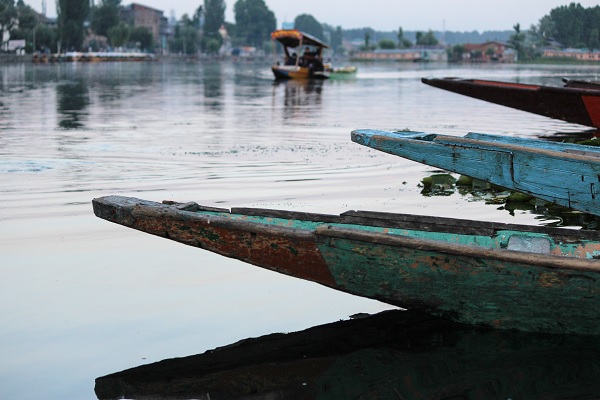
by admin | May 25, 2021 | Business, Employment, Private Jobs

Dal Lake (Photo:Maeeshat)
By Haroon Reshi for Maeeshat
Kashmir – the land of beautiful meadows, lakes, icy rivers, freezing deserts, green mountain passes, rugged terrain, foothills and a lot of picturesque plains – has lost another season of tourism to the ongoing violence, causing further dent to its already weaken economy.
If experts are believed, more than 60 percent population of this state is directly or indirectly dependent on the tourism industry. The industry provides employment on daily wage basis to lakhs of people, mostly youngsters in every season.
But these days, just a small number of domestic and foreign tourists are seen in different tourist destinations of the Valley, despite the fact that the month of July is usually considered as the peak season for Kashmir’s tourism industry. But now most of the picturesque tourist destinations wear a deserted look and people related to the trade are sitting idle and hopeless. From a small guest house to a five-star hotel, room occupancy is almost zero.
To gauge the drop in tourist inflow, one can have a look at these official figures: As many as 67,181 tourists visited Kashmir in April this year. In the same period last year, the figure was at 1,42,761. In the first four months last year, 4,03,442 tourists had visited the Valley and in the corresponding period this year, the figure stands at just 1,81,102.
‘In the days of peace and tranquility, we used to have full advance bookings for the months of June, July and August. But this year, just a few tourist families shown up at our hotel, forcing us to curtail our staff members,’ Farooq Ahmad, manager at a hotel in Gulmarg tells Maeeshat.
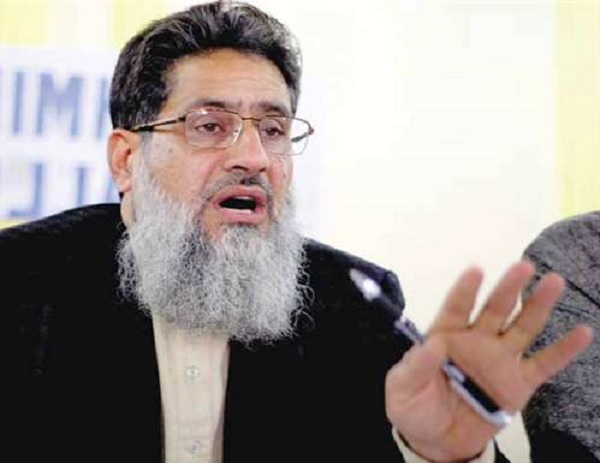
Muhammed Yasin Khan, Trade Leader
In first six months last year, more than half a million tourists had visited Kashmir Valley. Then all of a sudden, a cycle of violence erupted throughout the Valley after the killing of militant commander Burhan Wani on July 8. Kashmir remained completely shut for about six months after his killing. During the protests in this period, more than one hundred people were killed, thousands wounded and many blinded by the pellet guns used by security forces. All tourists vanished from the Valley due to the violence. Noticing the gravity of the situation, hoteliers, traders and houseboat owners locked down their businesses for rest of the season.
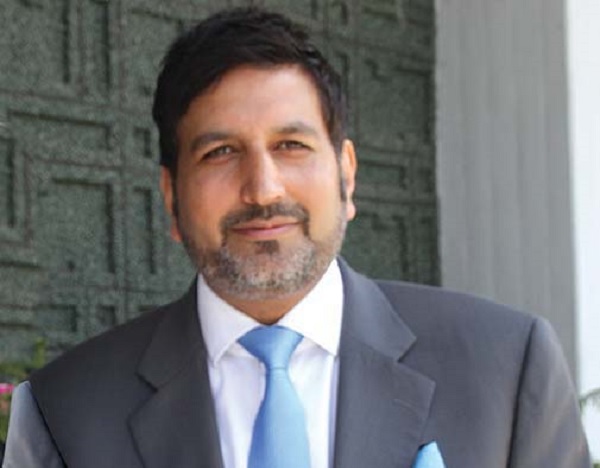
Shaikh Ashiq, Trade Leader
But this year, people in general and those related to the trade in particular had hoped for a good tourist season. The state government’s tourism department had also made several efforts to lure the tourists from within and outside the country. But all the expectations and efforts proved fruitless. Reliable sources in the state’s tourism department told Maeeshat that the number of tourists visited the Kashmir Valley this year up to now has not crossed even one lakh.
Most of the people in the tourism trade believe that Indian media, particularly some news channels played a destructive role to ruin Valley’s tourism by portraying Kashmir like the most dangerous place on earth.
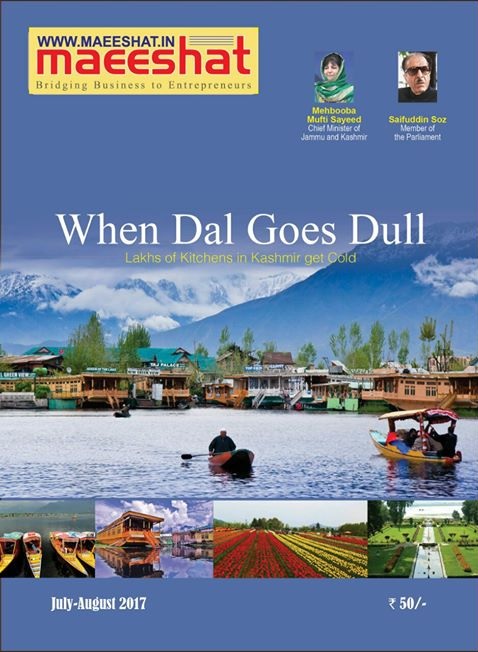
Maeeshat Magazine Cover Page (July-August 2017)
‘Indian media has damaged the tourism trade this year by aggregating about the situation. A small incident of stone pelting in some remote area of the Valley is being shown several times a day by some TV channels. Debates, full of hatred against Kashmiri Muslims, are organised everyday on prime time by these channels just to raise their TRPs. After watching all this on TV, people who were preparing for a visit to Kashmir this year, changed their plan,’ Muhammad Azim Tuman, former head of the Kashmir Houseboat Owners Association said.
Tuman himself owns three large-sized houseboats which are floating on the waters of Srinagar’s famous Nigeen Lake.
‘All the three houseboats have remained vacant since July last year,’ he said. ‘Keeping a houseboat prepare to host the guests is not an easy task. It takes around 10 lakh rupees annually to maintain a houseboat and to keep its staff alerts to look after the visitors,’ Tuman added.

Azim Tuman, Houseboat Owner
Every houseboat has at least three to four salaried staff members including a cleaner, a cook, a waiter and a keeper. Then there are other expenditures like procurement of drinking water, electricity bills and municipality taxes. It needs a huge investment throughout the year to be ready to host the guests in our houseboats, Tuman explains.
From a big hotelier to a small boatman and from a houseboat owner to a street vendor, everybody seems effected due to the decline in tourism industry.
Take the case of Ajaz Wani, a Shikara wala in the Dal Lake. He says, ‘Till July 8 last year, I used to earn Rs 1000 to Rs 1500 each day. But this year I have hardly earned more than a few thousand rupees so far.’ There are hundreds of people like Ajaz who are completely dependent on tourists for their livelihood. ‘I have my mother and two school-going sisters to take care of. If there are no tourists visiting Dal Lake, for me it simply means poverty at my home,’ Ajaz told Maeeshat.
The government has fixed the rate for one hour riding in Shikara in the Lake at Rs 400, which according to Ajaz is a “very good tariff’ provided there are tourists regularly coming to the shores of the Lake.
Now the recent terror attack on Amarnath pilgrims in South Kashmir, which killed eight including five women, has further reduced the chances of any improvement in the situation. ‘The unfortunate incident of the attack on Amarnath Yatris has diminished our hope now. We have lost this season too,’ says Ajaz.
Many stakeholders are blaming the government for the unfortunate situation in Kashmir.
Muhammad Yasin Khan, president of Kashmir Traders and Manufactures Association, says, ‘It seems the government does not want an economically flourishing Kahsmir…If it is not so, then why it does not stop news channels from portraying Kashmir as a dangerous place. There is no danger in Kashmir. Nobody harms any outsider here. If thousands of Amarnath Yatris can visit Kashmir every day, why can’t the tourists come over here?’
‘Modi government could have taken several steps to make sure that tourist inflow does not stop in Kashmir. At least, it could have stopped the negative coverage of Kashmir in a section of electronic media,’ Khan added.
Pertinently, the tourism industry in Kashmir has been frequently fluctuating up and down during last 27 years of insurgency.
Before the armed insurgency started in Jammu and Kashmir in late 1980s, tourism was the most important part of the state economy. According the official records, eight lakh tourists (Amarnath pilgrims not included) had visited Kashmir in 1989, before the first ever bomb blast in Srinagar. Western and European countries issued negative travel advisories restraining their citizens from travelling to the troubled Kashmir.
The revival of tourism in the Valley came with a significant number of visitors in 2004, when it touched nearly four lakhs, in addition to four lakhs more who went on the Amarnath yatra.
During the past several years, the state government has taken a series of initiatives to develop infrastructure in the state so that it can accommodate more and more tourists in the state, particularly in the Valley. Apart from famous tourist destination like Gulmarg, Sonamarg and Pahalgam, the government has developed Bangus Valley, Verinag, Kokarnag, Ahrabal, Doodhpatheri, Yousmarg and Manasbal in the Valley to lure the domestic and foreign tourists. Construction of inter-district roads leading to these places has been done during the past decade. The government has also developed the heritage places and shrines to make them attractive to the tourists.
But all these efforts are fruitless because of the uncertainty in the state. Many stakeholders believe that tourism industry in Kashmir cannot be flourished until the Kashmir dispute is resolved once for all. Sheikh Ashiq, a prominent businessman and former president of Kashmir Chamber of Commerce and Industries (KCCI), says, ‘We need a permanent solution to the situation. After every few years, we have a bad situation here. After uprising in 2008 and 2010, we had the worst ever situation last year when more than hundred people were killed during violent protests. How can we have a normal life here in such circumstances?’










